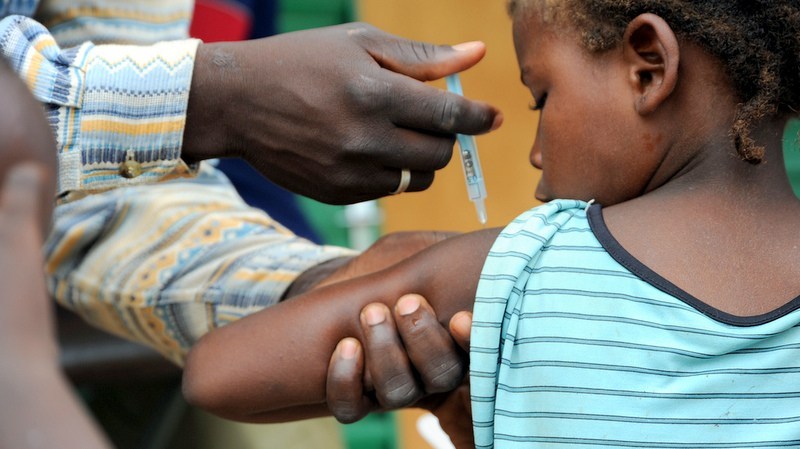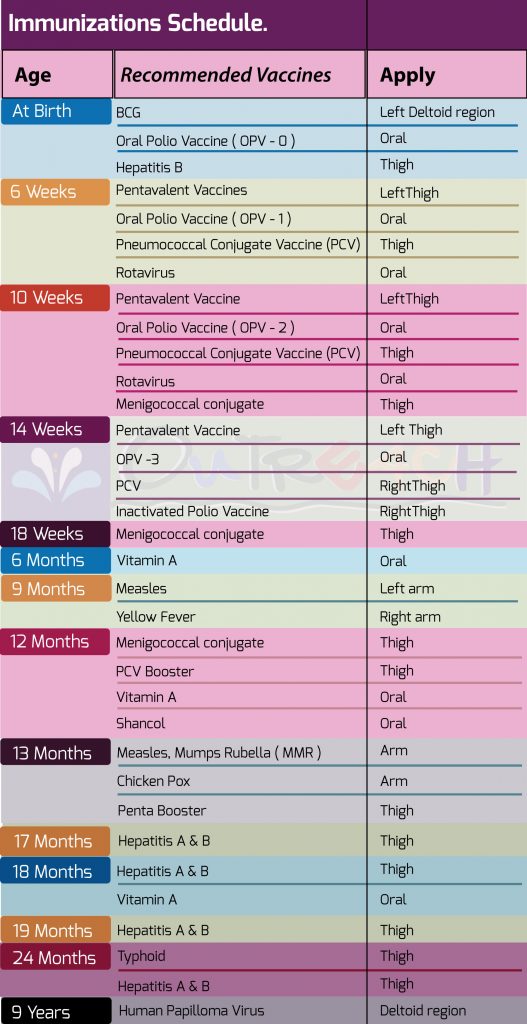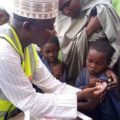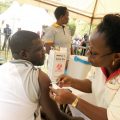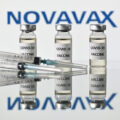Meningitis is an inflammation of the membranes (meninges) surrounding your brain and spinal cord. The swelling from meningitis typically triggers symptoms such as headache, fever, and a stiff neck. Over 10,000 cases of meningitis occur annually in Nigeria; in 2017 alone, 14,766 cases were reported with 1,207 deaths. Vaccines are however available for the prevention and control of meningitis outbreaks. Meningitis vaccine refers to any of the vaccines used to prevent infection by Neisseria meningitidis. Different versions are effective against some or all of the following types of meningococcus: A, B, C, W-135, and Y. The vaccines are between 85 and 100% effective for at least two years. SEE: National Programme on Immunization (NPI) schedule
How do people get meningitis?
In many cases, bacterial meningitis starts when bacteria get into the bloodstream from the sinuses, ears, or throat. The bacteria then travel through the bloodstream to the brain. The bacteria that cause meningitis can spread when people who are infected cough or sneeze.
Can you catch meningitis from another person?
An infected person’s throat secretions, like phlegm and saliva, contain bacteria. When that person coughs or sneezes the bacteria travel through the air. But most of the germs that can lead to bacterial meningitis aren’t contagious. Not all bacteria that cause meningitis are spread from one person to another.
Can a baby get meningitis in the womb?
It’s rare for newborns to contract meningitis, if a mum is infected with the bacterium listeria during pregnancy, it can cross the placenta to her baby. A listeria infection raises the risk of a baby being born with neonatal meningitis or developing it after birth.
Can a newborn baby survive with meningitis?
Although meningitis can affect people of any age, babies under 2 are at the highest risk of getting meningitis. It’s a serious condition, but 90 percent of these babies survive. The same study notes anywhere from 20 to 50 percent of them have long-term complications, like learning difficulties and vision problems.
Can meningitis be cured?
Early diagnosis and treatment will prevent brain damage and death. Bacterial meningitis is treated with intravenous antibiotics. There’s no specific antibiotic for bacterial meningitis. Viral meningitis may resolve on its own, but some causes of viral meningitis will be treated with intravenous antiviral medications.
How do you check for meningitis?
Blood is drawn to check the white and red blood cell counts. A chest X-ray film may be obtained to look for signs of pneumonia or fluid in the lungs. Other tests may be performed to look for other sources of infection. Spinal tap: A spinal tap, or lumbar puncture, is necessary to diagnose meningitis.
What is the first sign of meningitis?
Meningitis and septicemia can kill in hours, it is important to know the symptoms. The first symptoms are usually fever, vomiting, headache, and feeling unwell. Limb pain, pale skin, and cold hands and feet often appear earlier than the rash, neck stiffness, dislike of bright lights, and confusion.
Can you get meningitis If you’ve been vaccinated?
Because the vaccines do not protect against all causes of meningitis, it is still possible that someone could receive the vaccine and still get meningitis from a different strain not protected by the vaccine. But the risk of contracting meningococcal meningitis is significantly lower after the vaccine.
At what age do you vaccinate for meningitis?
All 11 to 12-year-olds should be vaccinated with a meningococcal conjugate vaccine, with a booster dose given at 16 years old. All teens may also be vaccinated with a serogroup B meningococcal vaccine, preferably at 16 through 18 years old.
Can babies get vaccinated for meningitis?
Meningitis vaccine for babies in Nigeria is straightforward, children get it when they’re between 2 months and 15 months old. It’s also given to children over age 5 or adults with certain medical conditions.
How long is meningitis vaccine good for?
The meningitis vaccine takes two weeks to fully kick in and should protect you for three to five years. People with HIV may not respond as well to the vaccine, so it’s recommended that they receive two doses — a booster shot, in essence – two to three months apart.
Types of Meningitis vaccine in Nigeria
In 2017, WHO began a vaccination campaign after an outbreak of meningitis C, a strain of meningitis that first emerged in the country in 2013, since then the country has reported 4637 suspected cases and 489 deaths across five states. In Nigeria, three meningococcal vaccines are available:
Meningococcal polysaccharide vaccine (MPSV4): This vaccine sold as Menomune is licensed for people of all ages, but it is not recommended for children younger than 2 years. It protects against serogroups A, C, W, and Y. Menomune has been available since the 1970s. The duration of immunity mediated by Menomune (MPSV-4) is three years or less in children aged under 5 because it does not generate memory T cells. Attempting to overcome this problem by repeated immunization results in a diminished, not increased, antibody response, so boosters are not recommended with this vaccine.
Meningococcal conjugate vaccine (MCV4): This vaccine is sold as Menactra, MenHibrix, and Menveo. Since the introduction of MACV in 2010, more than 260 million people have been vaccinated across 19 countries. This has resulted in a reduction of the number of meningitis cases by more than 57%. Much work, however, remains to be done to protect the region from meningitis C outbreaks and other types of the disease. The meningococcal conjugate vaccine protects against four types of meningococcal bacteria (called types A, C, W, and Y). In August 2018, Nigeria introduced the Meningitis A Conjugate Vaccine into the routine Expanded Programme on Immunization (EPI) schedule.
Serogroup B meningococcal vaccine: This vaccine is sold as Trumenba and Bexsero and licensed for people 10 years or older who are at increased risk for serogroup B meningococcal infections. It protects against serogroup B. These vaccines are recommended routinely for people 10 years or older who are at increased risk for serogroup B meningococcal infections, including:
- People at risk because of a serogroup B meningococcal disease outbreak
- Anyone whose spleen is damaged or has been removed
- Anyone with a rare immune system condition called ”persistent complement component deficiency”
- Anyone taking a drug called eculizumab (also called Soliris®)
- Microbiologists who routinely work with N. meningitidis isolates
- These vaccines may also be given to anyone 16 through 23 years old to provide short-term protection against most strains of serogroup B meningococcal disease; 16 through 18 years are the preferred ages for vaccination.
Which meningococcal vaccine should I get?
The World Health Organization recommends vaccination with a meningococcal conjugate vaccine for all preteens and teens at 11 to 12 years old, with a booster dose at 16 years old. Teens and young adults (16 through 23-year-olds) also may be vaccinated with a serogroup B meningococcal vaccine. See Where To Get Hepatitis B Vaccine In Nigeria

